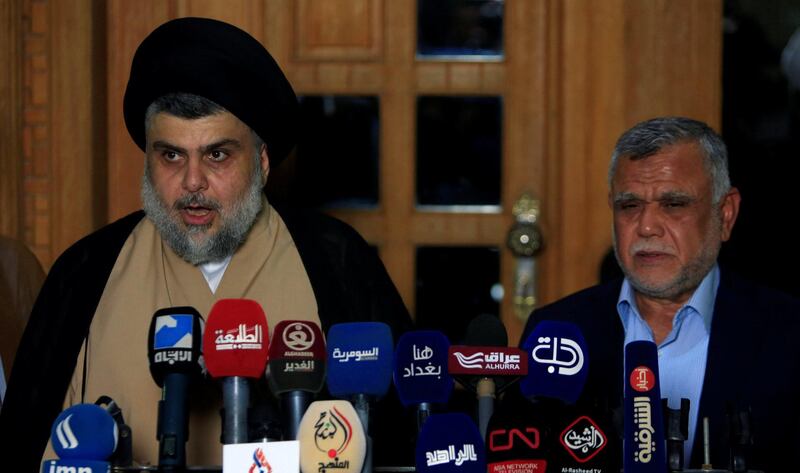Iraqi militia leader Hadi Al Ameri withdrew his candidacy for prime minister on Tuesday, leaving space for new candidates to take the nation's top political post.
The decision is expected to cause further delays to negotiations over the formation of a government that have already lasted four months since elections in May.
Mr Al Ameri, a prominent but controversial Shiite militia commander, heads the Fatih coalition bloc which came in second in May’s parliamentary elections. It has been vying to build the largest bloc which would form the government with him as prime minister.
“I would like to announce to the dear Iraqi people the withdrawal of my candidacy for prime minister, to open the way for serious dialogue to elect a prime minister and his government according to the vision of the Supreme religious authority,” he said during a press conference.
The Shiite leader's coalition is composed of political groups tied to Iran-backed militias who assisted Iraqi security forces in their battle against ISIS.
Mr Al Ameri's Badr Organisation, a political umbrella group of Shiite militias, controls the country's interior ministry.
His Fatih alliance has been in advanced talks with Shiite cleric Moqtada Al Sadr to form a new government coalition in recent days.
Mr Al Sadr, whose Sairoon bloc scored a surprising victory in the elections, portrays himself as a fierce nationalist opposed to both US and Iranian interference in Iraq. He has formed an alliance with incumbent Prime Minister Haider Al Abadi since June, which now looks set to falter after the cleric announced he will form an alliance with Mr Al Ameri.
_________
Read more:
Iraqi PM Abadi weakened as Sistani appears to withdraw support
Iraqi PM Haider Al Abadi faces calls to quit over deadly violence in Basra
US calls for 'moderate, nationalist' government ahead of Iraqi parliament opening
_________
In recent days, Mr Al Abadi acknowledged that his days in office as limited, saying he “would not cling to power”.
The premier was credited with defeating ISIS and was expected to easily gain a second term in May’s parliamentary elections, in which he had the backing of the US and other Western states.
But, today, he stands alone. His Victory coalition has unraveled and his political partners are abandoning him for alliances with blocs loyal to Iran. He is still in office due to his opponents' failure to agree on the formation of a government.
Mr Al Abadi was unable to play legislative politics and wasn't able to gain influence over the judiciary of his opponents, Renad Mansour, senior research fellow at Chatham House, told The National.
"Although to some he may have said the right thing, he couldn’t really build a strong base and he couldn’t play politics among the different factions and because of that he quickly lost favour," Mr Mansour said.
The premier never really competed as a politician for a second term. If he had received a strong parliamentary result for his bloc, he might have been more inspired in his bid for reappointment, Michael Knights, senior fellow at The Washington Institute for Near East Policy, said.
“But he instead sat back, ran the country and waited for others to put him on the throne again, as in 2014. Mr Abadi never sought the role in 2014 and he didn't really try to get it this time either,” Mr Knights said.
A source in Baghdad who requested anonymity said an initial agreement has been made between the dominant ruling Shiite groups to nominate former oil minister Adel Abdul Mehdi for the premier's position.
Mr Abdul Mehdi is known to have good relations with Sunni, Shiite and Kurdish parties in government.
The politician appears to meet the most important requirement of the top position: an ability to achieve consensus between the Shiite, Sunni and Kurdish parties. He also is required to maintain good relations with both the US and Iran.
Other potential candidates are the governor of Basra, Asaad Al Eidani, and Abdul Wahab Al Saadi, a commander of the Iraqi Counter-Terrorism Service, an elite faction of the military that battled ISIS throughout its three-year occupation.





